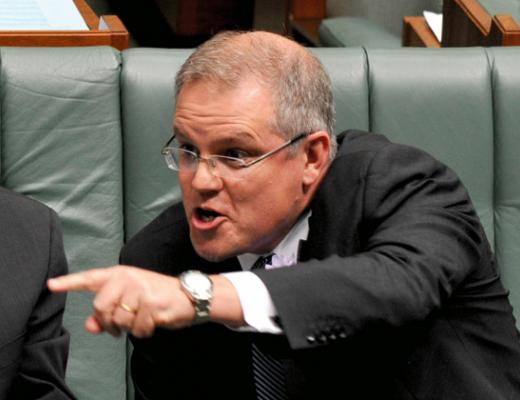It’s reflective of just how punitive Australia’s refugee policy has become that the government still has the ability to horrify thinking Australians this long after Kevin Rudd announced his PNG Solution. At the time it seemed the lowest ebb in what has been a very dark decade for Australia’s treatment of the world’s most vulnerable people. But under Scott Morrison, there have been almost weekly revelations of further brutality inflicted upon refugees that still have the power to shock and abhor a nation that has long struggled to empathise with non-white victims.
Questions of morality and legality aside, Scott Morrison has had a good year politically. In a frontbench full of failures, he stands alongside Foreign Minister Julie Bishop and Trade Minister Andrew Robb as the standout performers for the Coalition.
The Liberal Party came to the last election promising to ‘stop the boats’ and, save for a few exceptions, that’s exactly what they’ve done. Their means of achieving this have been shameful, however. There are more refugees now than there’s been at any time since the World War II and Australia bears a significant responsibility for this.
The so-called War on Terror – launched by Bush, Blair and Howard – has led to the deaths of over a million people, spawned the rise of the Isis and Iraq and Syria have been sacked. Now we turn our backs on the very people whose existence we ruined, on the families of the children our bombs killed and whom we claimed we were helping.
But all this is in the past, Scott Morrison has met his policy objectives, the boats have stopped, genuine refugees who have no other means of fleeing but by boat know they will never be settled in Australia. Scott Morrison has won. Why then does he continue to pass legislation that is gratuitously punitive and inconsistent with the rule of law?
Writing in the Fairfax press over the weekend, Adam Morton neatly summarised the latest government legislation:
Along with other recent changes, the bill gives Immigration Minister Scott Morrison unprecedented powers over Australia’s response to asylum seekers. The changes include: removing any duty for government to comply with international law or act fairly when detaining asylum seekers at sea; introducing fast-tracking refugee status discriminations, a step Amnesty International says will see some returned to places where they face persecution and torture; blocking asylum seekers’ right to claim protection on national interest grounds without further explanation.
Just let that all sink in for a minute. The Coalition has wound back the measures put in place by the international community following the horrors of the Second World War because they constrain their current policies.
Then there’s the reintroduction of temporary protection visas, which have been proven time and again not to work. Refugees the government deems to be ‘genuine’ won’t be granted permanent residence, rather they’ll live indefinitely in limbo under the constant threat of being returned to whence they came once its considered safe. They will effectively be exiled in Australia, with no provision to be reunited with their families.
I apologise if it seems I’m doing a Tony Abbott and repeating myself, but I think it warrants emphasis: prior to this new legislation the government had achieved its number one policy outcome. There is no practical need for new laws to scare asylum seekers into staying away. This is superfluous cruelty for its own sake.
Scott Morrison, a man whose political ambitions are well known in Canberra, has put his own career ahead of the lives of refugees, many of whom are the innocent victims of his party’s wars. He seemingly thinks a ‘tough’ stance on this issue will be good for his own advancement
The standard liberal retort to the ‘we’ve stopped the boats’ statement is: ‘But at what cost?’ It’s the wrong question though; it invites a quantifiable response. The government can easily point out that no one’s dying at sea, whilst the real ‘cost’ is obviously far more difficult to measure.
It’s important not to lose sight of the fact that to many people this is not just a rhetorical question and, when considered out of this context, it doesn’t give one much scope to expose the government’s atrocities.
The question (when asked genuinely) and its inevitable response, thus, implies that there’s merit to the government’s claims of humanitarianism and places the emphasis on how many lives Australia’s policy has saved, rather than how many lives it’s ruined.
The reality is that some refugees, fleeing from some of the most dangerous places in the world, will die in their efforts to escape persecution. It’s self-evidently risky, whether they are Afghanis, Iraqis, Iranians, Burmese or Sri Lankans; the nature of the regimes and the often-perilous journeys dictate that not everyone will make it to their intended place of refuge. Similarly, by removing these avenues of escape people will be killed, but in obviously unquantifiable numbers.
Scott Morriosn knows this, but still insists he’s saving lives because people are not dying at sea in an effort to reach Australia. It’s a convenient statistic to hide behind, but it says nothing about Australia’s responsibility to alleviate the suffering of refugees.
In his quest for that elusive statistic – zero boats, zero deaths – Scott Morrison has subverted international law, kept innocent people locked up indefinitely in Pacific island gulags where they’ve been subjected to mental and physical torture, returned them to the autocratic regimes they’ve fled and gloated that they’ll never be room for them in his country. This, he tells us, is good policy. This, he tells us, is humanitarianism.

